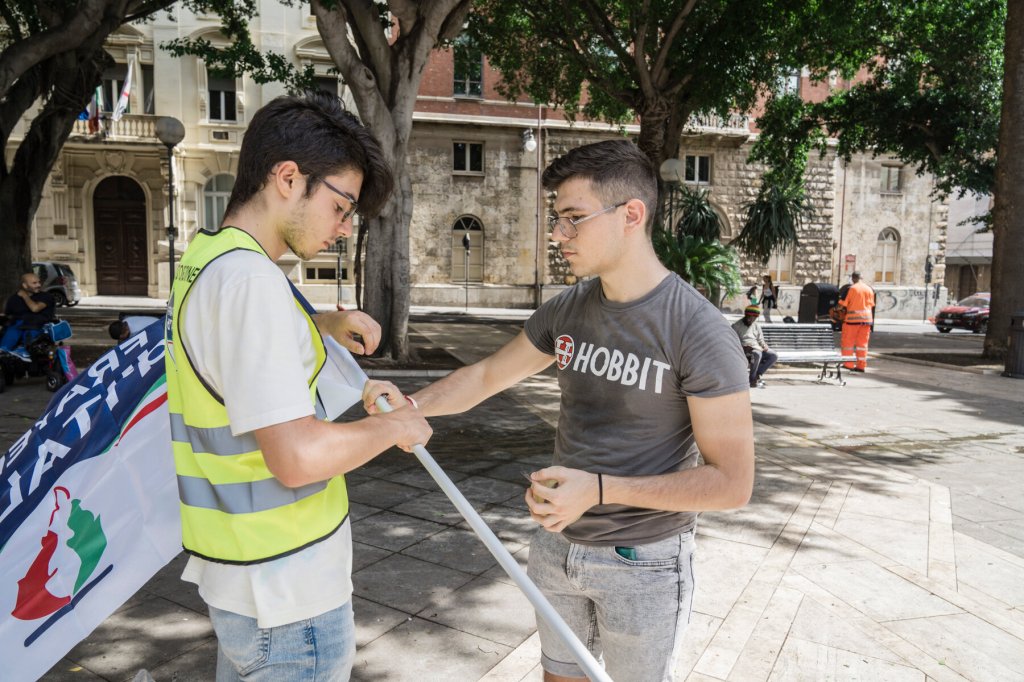
This weblog article was originally written for Dr. Jennifer Evans’ upper-division seminar, “Populism and Authoritarianism in Contemporary Europe,” at Carleton University. To view more entries in this web blog assignment, see the FightingFascistFantasy website.
For much of the world, the Baggins of Bag End are just one of the many fantastical creatures that populate Tolkien’s work. For Italy’s far-right, however, Hobbits take on a more sinister meaning.
When imagining the ideal fascist, Frodo Baggins would not be the first to come to mind. With their short stature and timid nature, Hobbits are far from the hyper-masculine warrior of Aryan mythos, opting to spend lazy days smoking their pipes rather than lead any type of anti-democratic revolution. Yet for over the last 40 years, Hobbits have been a key symbol among Italian fascists, inspiring the resurgence of far-right politics since the book’s translation in 1970.
The far-right identification with Hobbits largely emerged from feelings of dissatisfaction among far-right youth. Marginalized from the dominant left culture of postwar Italy and detached from the older generation of fascists, young radicals sought to rejuvenate the far-right movement through a drastic change in ideology and tactic. This necessitated a complete overhaul of far-right culture, seeking new symbols and heroes to differentiate themselves from the militarism of interwar fascist politics.
The break with modernity that young fascists sought was found within the pages of Tolkien’s Lord of the Rings. Spurred by Julius Evola, far-right youth took up the belief that modernity’s most pressing issues could be solved through the resurgence of myth within politics . In his manipulation of Anglo-Saxon lore to fit a conservative and monarchist outlook, Tolkien’s romanticization of traditionalism appealed to youth’s anti-modern sentiments. As self-identified outsiders, young fascists connected with Frodo’s underdog status and appreciated the the novel’s emphasis on collective action. These youth soon began using Lord of the Rings to identify the “in-group” of the far-right fellowship, appropriating symbols like the Celtic cross as part of their fascist rebranding.
This identification with Lord of the Rings culminated in 1977 with the first ever Camp Hobbit. Organized by Movimento Sociale Italiano (MSI) and the Youth Front, this two-day pseudo-fan convention blurred the lines between culture and politics. On the surface, the Camp Hobbit had no overt political agenda beyond abstract values like courage, heroism, and comradery. Yet bellow the surface, Camp Hobbit was part of the Youth Front’s explicit strategy reinvigorate youth identification with this new era of fascist politics. With a wide variety of activities – including art exhibitions, concerts, conferences, cabaret, and ecological debates – far-right parties hoped to attract the attention of Tolkien lovers from who might not otherwise be interested in far-right politics.
This adoration of the Lord of the Rings remains a vibrant part of Italy’s far-right movement. As talks of resurrecting Camp Hobbit for its fortieth anniversary emerge from self-identified super-fan Giorgia Meloni, now more than ever we should be paying attention to the politics of Hobbits.



Leave a Reply